
Ella Jane Fitzgerald was an American jazz singer, sometimes referred to as the "First Lady of Song", "Queen of Jazz", and "Lady Ella". She was noted for her purity of tone, impeccable diction, phrasing, timing, intonation, and a "horn-like" improvisational ability, particularly in her scat singing.
"Take the 'A' Train" is a jazz standard by Billy Strayhorn that was the signature tune of the Duke Ellington orchestra.
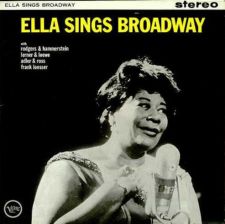
Ella Sings Broadway is a 1963 studio album by the American jazz singer Ella Fitzgerald, with an orchestra arranged and conducted by Frank DeVol. Shortly before the sessions for Ella Sings Broadway, Ella had recorded two singles with Marty Paich, the Antonio Carlos Jobim song 'Desafinado' and a Bossa Nova version of the jazz standard 'Stardust'. This prompted many Ella Fitzgerald fans and scholars to conclude that these sessions were also led by Paich. However, the original scores and parts exist in Ella Fitzgerald's library and it was determined that all the music was arranged by Frank DeVol. In fact, DeVol had previously worked with Ella Fitzgerald having written arrangements for Hello Love (1957), Get Happy (1957), Live Someone in Love (1957), Ella Sings Sweet Songs For Swingers (1958), and Ella Wishes You A Swinging Christmas (1960).

Like Someone in Love is a 1957 studio album by the American jazz singer Ella Fitzgerald, with a studio orchestra arranged and conducted by Frank DeVol. This album represents a fine example of Ella's singing from this period, recorded at the same time as her albums with Louis Armstrong.

Ella Swings Brightly with Nelson is a 1962 studio album by the American jazz singer Ella Fitzgerald, accompanied by an orchestra arranged by Nelson Riddle.
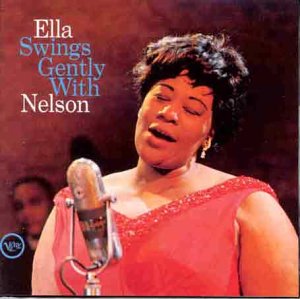
Ella Swings Gently with Nelson is a 1962 studio album by the American jazz singer Ella Fitzgerald, with an orchestra arranged and conducted by Nelson Riddle. This album is one of a pair, the other being Ella Swings Brightly with Nelson, that were released in 1962.

Ella Fitzgerald Sings Sweet Songs for Swingers is a 1959 album by the American jazz singer Ella Fitzgerald, recorded with a studio Orchestra arranged and conducted by Frank DeVol.

Ella Wishes You a Swinging Christmas is a 1960 album by the American jazz singer Ella Fitzgerald, recorded in the summer of 1960, with a studio orchestra arranged and conducted by Frank DeVol. The tracks are all secular Christmas seasonal songs, in contrast to her second Christmas album released in 1967.

Ella in Rome: The Birthday Concert is a live album by Ella Fitzgerald, with a jazz trio led by Lou Levy, and also featuring the Oscar Peterson trio. Recorded in 1958, it was released thirty years later.

Ella Fitzgerald Sings the Cole Porter Song Book is a 1956 studio double album by American jazz singer Ella Fitzgerald, accompanied by a studio orchestra conducted and arranged by Buddy Bregman, focusing on the songs of Cole Porter.
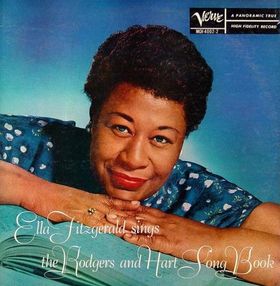
Ella Fitzgerald Sings the Rodgers and Hart Song Book is a 1956 studio album by the American jazz singer Ella Fitzgerald, with a studio orchestra conducted and arranged by Buddy Bregman, focusing on the songs written by Richard Rodgers and Lorenz Hart.

Ella Fitzgerald Sings the Duke Ellington Song Book is a 1957 studio album by the American jazz singer Ella Fitzgerald, accompanied by Duke Ellington and his orchestra, focusing on Ellington's songs.

Ella Fitzgerald Sings the George and Ira Gershwin Song Book is a box set by American jazz singer Ella Fitzgerald that contains songs by George and Ira Gershwin with arrangements by Nelson Riddle. It was produced by Norman Granz, Fitzgerald's manager and the founder of Verve Records. Fifty-nine songs were recorded in the span of eight months in 1959. It is one of the eight album releases comprising what is possibly Fitzgerald's greatest musical legacy: Ella Fitzgerald Sings The Complete American Songbook, in which she recorded, with top arrangers and musicians, a comprehensive collection of both well-known and obscure songs from the Great American Songbook canon, written by the likes of Cole Porter, Rodgers & Hart, Irving Berlin, Duke Ellington, George and Ira Gershwin, Harold Arlen, Jerome Kern, and Johnny Mercer.

Ella Fitzgerald Sings the Irving Berlin Song Book is a 1958 studio album by the American jazz singer Ella Fitzgerald, with a studio orchestra conducted and arranged by Paul Weston, focusing on the songs of Irving Berlin. It was part of the popular and influential Songbook series.

Ella Fitzgerald Sings the Jerome Kern Song Book is a 1963 studio album by the American jazz singer Ella Fitzgerald accompanied by an orchestra arranged and conducted by Nelson Riddle. The album focuses on the songs of the composer Jerome Kern.
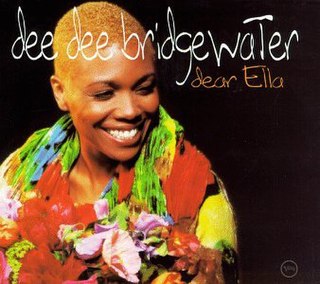
Dear Ella is a 1997 studio album by Dee Dee Bridgewater, recorded in tribute to Ella Fitzgerald, who had died the previous year.

Nicole Rachel "Nikki" Yanofsky is a Canadian jazz-pop singer from Montreal, Quebec. She sang the CTV Olympic broadcast theme song, "I Believe", which was also the theme song of the 2010 Winter Olympic Games. She also performed at the opening and closing ceremonies for the Olympics and at the opening ceremony of the 2010 Winter Paralympic Games. She has released four studio albums to date, including Nikki in 2010, Little Secret in 2014, Turn Down the Sound in 2020, and Nikki By Starlight in 2022.
"(If You Can't Sing It) You'll Have to Swing It " is a song written by Sam Coslow for Rhythm on the Range that is strongly associated with Ella Fitzgerald.
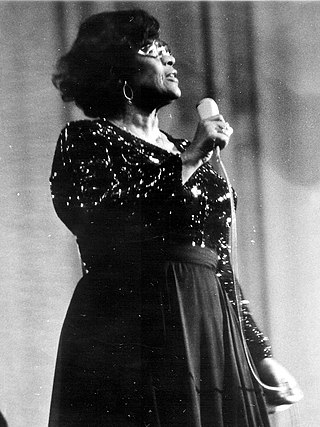
Gold is a two-disc compilation album by Ella Fitzgerald that was released on the Verve Records label in 2007. The 40 tracks span Fitzgerald's career from 1938 to 1964.

The collaborations between Ella Fitzgerald and Louis Armstrong have attracted much attention over the years. The artists were both widely known icons not just in the areas of big band, jazz, and swing music but across 20th century popular music in general. The two African-American musicians produced three official releases together in Ella and Louis (1956), Ella and Louis Again (1957), and Porgy and Bess (1959). Each release earned both commercial and critical success. As well, tracks related to those albums have also appeared in various forms in multi-artist collections and other such records.


















